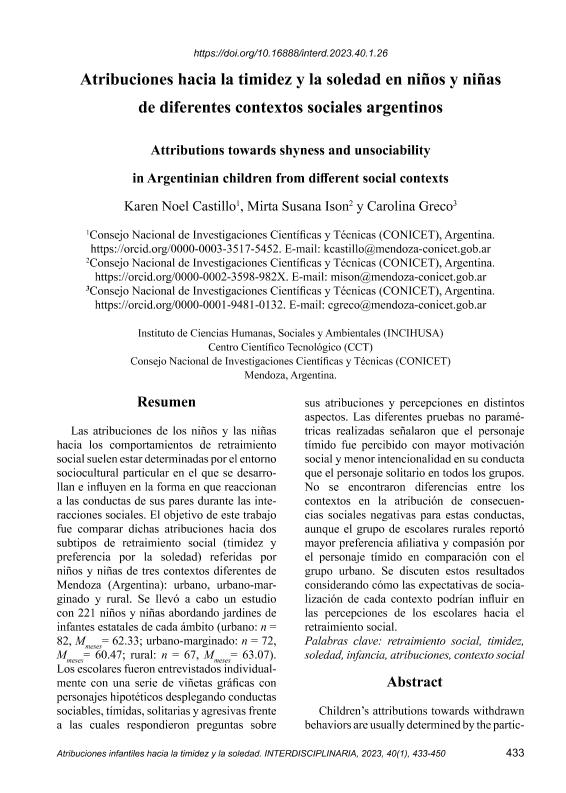Artículo
Las atribuciones de los niños y las niñas hacia los comportamientos de retraimiento social suelen estar determinadas por el entorno sociocultural particular en el que se desarrollan e influyen en la forma en que reaccionan a las conductas de sus pares durante las interacciones sociales. El objetivo de este trabajo fue comparar dichas atribuciones hacia dos subtipos de retraimiento social (timidez y preferencia por la soledad) referidas por niños y niñas de tres contextos diferentes de Mendoza (Argentina): urbano, urbano-marginado y rural. Se llevó a cabo un estudio con 221 niños y niñas abordando jardines de infantes estatales de cada ámbito (urbano: n = 82, Mmeses= 62.33; urbano-marginado: n = 72, Mmeses= 60.47; rural: n = 67, Mmeses= 63.07). Los escolares fueron entrevistados individualmente con una serie de viñetas gráficas con personajes hipotéticos desplegando conductas sociables, tímidas, solitarias y agresivas frente a las cuales respondieron preguntas sobre sus atribuciones y percepciones en distintos aspectos. Las diferentes pruebas no paramétricas realizadas señalaron que el personaje tímido fue percibido con mayor motivación social y menor intencionalidad en su conducta que el personaje solitario en todos los grupos. No se encontraron diferencias entre los contextos en la atribución de consecuencias sociales negativas para estas conductas, aunque el grupo de escolares rurales reportó mayor preferencia afiliativa y compasión por el personaje tímido en comparación con el grupo urbano. Se discuten estos resultados considerando cómo las expectativas de socialización de cada contexto podrían influir en las percepciones de los escolares hacia el retraimiento social. Children’s attributions towards withdrawn behaviors are usually determined by the partic tend to influence their behaviors and reactions. The aim of this work was to compare the attributions towards two subtypes of social withdrawal (shyness and unsociability) referred by children from three different contexts in Mendoza, Argentina: urban, urban-marginalized and rural. Participants were 221 kindergarten children from these contexts (urban: n = 82, Mmonths = 62.33; urban-marginalized: n = 72, Mmonths = 60.47; rural: n = 67, Mmonths = 63.07). Children were individually interviewed with a series of graphic vignettes with hypothetical characters displaying shy and unsociable behaviors, and for comparison purposes were also assessed aggressive and socially competent behaviors. After each vignette, children were asked a series of questions designed to assess their attributions toward each behavior in six dimensions: intentionality, social motivation, affiliative preference, social status, negative impact and sympathy. The results of this study showed that young children in the three contexts were able to distinguish social withdrawal from other types of behaviors (i.e., aggressiveness and sociability). Overall, withdrawn behaviors received more positive attributions (greater affiliative preference, better social position and less negative impact) than aggressive behaviors, although they were also perceived negatively in relation to more socially competent behaviors (the latter were attributed greater affiliative preference and best position within the peer group). Furthermore, it was observed that children from the three contexts made clearly distinctions among the different forms of social withdrawal in terms of intentionality and social motivation. Specifically, they reported that compared with unsociable characters, shy ones are more socially motivated and less intentional in their behavior, evocating greater feelings of compassion. However, some peculiarities can be appreciated in each context. The results indicated that children in the urban group reported greater feelings of sympathy for the shy character in relation to the unsociable, which was not evidenced in the other groups. In addition, children from the rural sample showed a greater preference for interact with the hypothetical shy peer than with the unsociable character and this inclination was also greater when compared with the urban sample. Taken together, these results may suggest that different socialization norms and expectations would evoke different meanings and implications to the socially withdrawn manifestations. It might be possible that in urban contexts children’s socialization expectations highlight extraversion and self-affirming behaviors which generate more empathetic reactions in front of passive or fearful manifestations as shyness. On the other hand, rural children may prefer peers who display shy behaviors possibly because it is in line with expectations of social cohesion and modesty that are value in this milieu. Nevertheless, no differences were found between shy and unsociable behaviors in any of the contexts in terms of social position and negative impact that they anticipated for the peer group. These results could provide some support for the idea that social withdrawal tends to be globally perceived as benign at an early age, and especially in the rural context, where it is a frequent and valued behavior. Although it is not possible with the limited variables included in this study to know which are the specific contextual aspects that affect some attributions and through what mechanisms they do so, these findings are an important starting point to continue deepening the socialization processes in urban, urban-marginalized and rural young children. This study is also one of the first to evaluate the knowledge and attributions of Argentinean children from different social context toward social withdrawal and provides new evidence on the differences in the cultural meaning and implications of withdrawn behaviors in early childhood.
Atribuciones hacia la timidez y la soledad en niños y niñas de diferentes contextos sociales argentinos
Título:
Attributions towards shyness and unsociability in Argentinian children from different social contexts
Fecha de publicación:
04/2023
Editorial:
Centro Interamericano de Investigaciones Psicológicas y Ciencias Afines
Revista:
Interdisciplinaria
ISSN:
0325-8203
e-ISSN:
1668-7027
Idioma:
Español
Tipo de recurso:
Artículo publicado
Clasificación temática:
Resumen
Archivos asociados
Licencia
Identificadores
Colecciones
Articulos(INCIHUSA)
Articulos de INST. DE CS. HUMANAS, SOC. Y AMBIENTALES
Articulos de INST. DE CS. HUMANAS, SOC. Y AMBIENTALES
Citación
Castillo, Karen Noel; Ison, Mirta Susana; Greco, Carolina; Atribuciones hacia la timidez y la soledad en niños y niñas de diferentes contextos sociales argentinos; Centro Interamericano de Investigaciones Psicológicas y Ciencias Afines; Interdisciplinaria; 40; 1; 4-2023; 433-450
Compartir
Altmétricas




